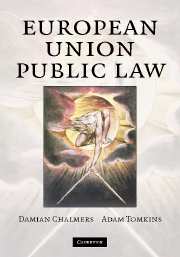Book contents
- Frontmatter
- Map of the European Union
- Preface
- Contents
- Abbreviations
- Acknowledgments
- Table of Cases
- Table of Treaties, Instruments and Legislation
- Table of Equivalents
- Electronic Working Paper Series
- PART I Constitutional and Institutional Law
- 1 European integration and the treaty on European Union
- 2 Constitutionalism and the ‘failure’ of the Constitutional Treaty
- 3 The EU Institutions
- 4 Community law-making
- 5 Sovereignty and federalism: the authority of EU law and its limits
- 6 Fundamental rights
- 7 Judicial relations in the European Union
- PART II Administrative law
- Index
- References
2 - Constitutionalism and the ‘failure’ of the Constitutional Treaty
Published online by Cambridge University Press: 05 June 2012
- Frontmatter
- Map of the European Union
- Preface
- Contents
- Abbreviations
- Acknowledgments
- Table of Cases
- Table of Treaties, Instruments and Legislation
- Table of Equivalents
- Electronic Working Paper Series
- PART I Constitutional and Institutional Law
- 1 European integration and the treaty on European Union
- 2 Constitutionalism and the ‘failure’ of the Constitutional Treaty
- 3 The EU Institutions
- 4 Community law-making
- 5 Sovereignty and federalism: the authority of EU law and its limits
- 6 Fundamental rights
- 7 Judicial relations in the European Union
- PART II Administrative law
- Index
- References
Summary
Introduction
The previous chapter surveyed the development of the European Union by tracing the making of its various Treaties, summarising both the original Treaty of Rome and its subsequent amendments through the Single European Act, the Maastricht Treaty on European Union and the Treaties of Amsterdam and Nice. The story told in the previous chapter was not supposed to end with the unsatisfactory compromises and loose ends of the Treaty of Nice: it was supposed to end with a new Constitutional Treaty for the European Union. The Constitutional Treaty (CT) was drafted by a grand and grandly named ‘Convention on the Future of Europe’, which sat from early 2002 until the summer of 2003. Its Draft Constitutional Treaty (DCT) was initially rejected by the European Council, with Spain and Poland leading the objections, concerned as they were with the reduction of their voting power in the Council of Ministers that the DCT would have entailed. After further deliberation and a change of government in Spain the Heads of State and Heads of Government meeting as the European Council in Rome finally signed the CT in October 2004. Ratification of the CT was a matter for each Member State. About ten Member States proposed to hold popular referenda; the remainder would allow ratification through national parliaments. The first of the referendums was held in Spain, where the CT was approved by 72 per cent of those who voted.
- Type
- Chapter
- Information
- European Union Public LawText and Materials, pp. 44 - 85Publisher: Cambridge University PressPrint publication year: 2007



